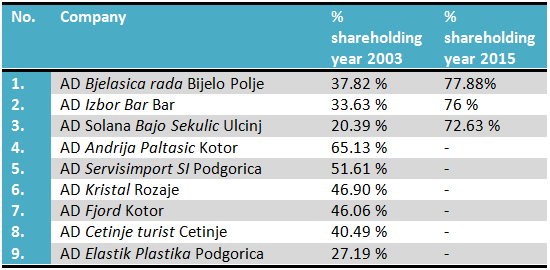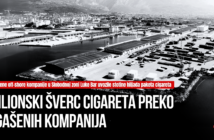WINNERS OF TRANSITION (1): How EUROFOND managed companies from its portfolio:
Investment fund Eurofond threw into bankruptcy eight of the nine companies in which it took majority control during the mass voucher privatization in Montenegro and after that process, simultaneously keeping strategic ownership in three companies: Saltworks from Ulcinj, Izbor from Bar and Bjelasica Rada from Bijelo Polje, the properties of which were worth €290 million at the end of last year.
Analysis on shareholding of Eurofond in privatized companies carried out by MANS Investigation Center and the daily Vijesti suggests that genuine motif of the owner of the investment fund was not ensuring survival of once respectable Montenegrin companies, keeping them operational and increasing employment, but acquiring ownership of their valuable real estates aimed at selling them and generating enormous profit.
Eurofond was established in 2001, on the eve of the mass voucher privatization, which was one of the models of privatization of the Montenegrin economy. It is a fund in which the prime minister Milo Djukanovic invested his vouchers during the voucher privatization because, as he put it, it was led by his friends. A Montenegrin businessman Veselin Barovic managed Eurofond over years, after which individuals from Montenegro and Bosnia and Herzegovina related to Barovic continued to manage it.
During the mass voucher privatization, which officially ended in 2002, Eurofond acquired more than 20 percent of the total capital in nine companies, namely: printing company Andrija Paltasic in Kotor (65 percent), Servisimport SI Podgorica (51 percent), Kristal Rozaje (46.9 percent), hotel and tourist company Fjord Kotor (46 percent), Cetinje turist (40 percent), Bjelasica Rada Bijelo Polje (37.8 percent), Izbor Bar (33 percent), Elastik plastika Podgorica (27 percent) and Saltworks Bajo Sekulic (20.4 percent).
However, in the following five years, Eurofond sold one company and closed five, and by the end of 2008 kept strategic ownership in only three companies: Saltworks Bajo Sekulic, in which the ownership has increased to 71.5 percent, Izbor from Bar where it increased to 75.8 percent and Bjelasica Rada from Bijelo Polje, where the share increased to 77 percent.
At the close of last year, Eurofond had roughly the same percentage of ownership in three of the companies: the Saltworks and Izbor, being in bankruptcy, and Bjelasica Rada, which has recently emerged from bankruptcy.
All three companies have valuable properties, and official data of Eurofond shows that their total value at the end of the last year amounted to nearly €290 million. However, the fund did not pay the real worth for the shares which ensured it a majority ownership – it actually paid around €12 million for shares in the Saltworks and Bjelasica Rada, while accurate information on the amount paid for the shares in Izbor from Bar is not available.
Individually, the Saltworks has the highest value, covering 14.5 square kilometers in the coastal area of Ulcinj. As early as in 2000, the value of the Ulcinj-based company was appraised at 110.3 million marks, which corresponds to an approximate value of €55 million. The company went bankrupt in 2005, and Eurofond held 33.87 percent of its capital at the time, which means that by the end of the mass voucher privatization it increased its ownership in the company by approximately 13 percent. According to the media, Eurofond paid shares around €800,000 at the time.
Documents held by MANS Investigation Center show that in the period from 2005 to 2009 Eurofond had a total of five share issues to increase the capital, and which generated around €5.9 million. All recapitalizations were aimed at investing in the production process, but the money was never used for such purpose.
According to the annual reports on the business activities of Eurofond for the last three years, which are publicly available, authorized appraisers assessed the property of the Saltworks at €257.8 million a few years ago, but it has not been acknowledged who carried out the assessment. In 2012, bankruptcy administrators of the Saltworks announced the first sale of the bankrupt’s property at that price, and after 11 failed tenders the price dropped to €179 million.
Meanwhile, the owners of Eurofond have been awaiting the Privatization Council’s decision whether in the process of privatization of the company they paid its market value or not, although the data show that for the acquisition of majority ownership in the Saltworks through stock market purchase of shares and recapitalization Eurofond did not pay more than €6.7 million.
As for the Bar-based company Izbor, which owns the department store in downtown Bar, supermarkets, shops, snack bars and warehouses, the audit report for 2007 shows that the value of its property, facilities and equipment was €8.8 million at the time, whereas the appraisal was carried out as far back as 1994.
That same year, Eurofond merged the company Andrija Paltasic from Kotor and Servisimport SI from Podgorica into Izbor, thus transferring into the Bar-based company their entire assets, rights and obligations, so the total value of real estate of the company Izbor in the following year increased to €30.9 million (€7.7 million worth land and €27.8 million worth buildings). At the end of 2015, the value of real estate, facilities and equipment of Izbor was €24.8 million.
Transformation program from February 2012, which envisaged construction of facilities through co-investing with another investor, especially on unused urban parcels in Podgorica and Susanj, confrims that Eurofond was predominantly interested in the property of the Bar-based company. It is also stated that the company held other locations in Podgorica, Bar, Kotor and Cetinje, where construction of hotels, shopping centers and commercial and residential buildings was planned.
It is not known how much Eurofond paid for the shares in order to acquire majority ownership in the company Izbor, which also went bankrupt.
When it comes to the company Bjelasica Rada from Bijelo Polje, the value of its property, facilities and equipment amounted to €6.8 million at the end of last year, according to available data from the financial reports, the appraisal of the company’s property was carried out in late 2003.
At the same time, the data Eurofond submitted to the Parliament’s Commission for Monitoring and Control of Privatization Procedures show that through stock market trading and several capital injections it paid around €5.1 million to acquire majority ownership of 78 percent in the company from Bijelo Polje. Just like in the case of the Saltworks from Ulcinj, an investment fund recapitalized Bjelasica Rada for the sake of production, but most of the money was never actually invested in it.
Investment funds represent powerful financial entities in which investors invest free assets, which are then invested by managing companies in companies’ equities, buy properties or other financial instruments. The issue of quality of corporate management in investment funds is essential to protect the interests of investors, whether they are major ones or the so-called “small” investors.
In Montenegro, the majority of investment funds have been formed thanks to the mass voucher privatization, because they were originally formed as privatization funds in which citizens invested their vouchers, and were later turned into an investment. A decade and a half after this process, the prevailing view of the public is that the mass voucher privatization enabled pouring a significant part of public wealth into private pockets, and that the funds have not fulfilled the expectations of citizens who gave them confidence by investing their vouchers in them.
Uncovered losses of 30 million
According to the official financial reports of the three companies, which are strategic owners of Eurofond, their uncovered losses stand at €30.8 million, at least.
At the end of last year uncovered loss of Izbor was nearly €13 million, whereas the loss of Bjelasica Rada was close to €9 million. Accumulated losses of the Saltworks amounted to €8 million, according to the available data from the end of 2013.
At the end of last year, the Bar-based company provided employment for 34 workers, while in Bijelo Polje there were 58 workers. The Ulcinj-based Saltworks has long since been closed.
Cast an eye on Montepranco
In 2009, Eurofond acquired the ownership of 13.3 percent in the company Montepranco-Bokaproduct, and according to the financial statements, at the end of last year, the value of Montepranco-Bokaproduct property, facilities and equipment amounted to €2.3 million.
However, there is no doubt that this is extremely underestimated value, which is based on the study which was made back in 1995 and on the assumption that the company owned agricultural land.
The company Montepranco-Bokaproduct has around one million square meters of land along the Adriatic Highway.
Citizens placed absolute trust in funds
Mass voucher privatization officially began in 2001 and ended a year later. Approximately 440,000 adult citizens received free vouchers, which they could transfer to family members, privatization funds or directly buy shares in companies. Privatization funds issued so-called investment units to citizens in exchange for vouchers, which were later transferred into shares.
According to publicly available data, shares of 221 Montenegrin companies were offered in the process of the mass voucher privatization. Total estimated value of capital in these companies amounted to DM7.8 billion, whereas for citizens who were eligible to participate in this process, the capital of the companies amounting to almost DM 2.2 billion was allocated.
Citizens directly invested over DM787 million in the companies, which was 33.4 percent of the total amount, they invested vouchers worth more than DM1.5 billion in the privatization funds , or 66.1 percent, while just over DM12 million or 0.5 percent was not invested. The funds invested their shares in 101 companies.
According to the rules from the times of the mass voucher privatization, a fund was entitled to hold 25 percent of the share capital of the company at most, while it could invest not more than 10 percent of its investment capital in a single company.
Authors:
Ines Mrdovic
Biljana Matijasevic
This text is created with the support of the European Union within the project “Zero Tolerance to Corruption”. Network for Affirmation of Non-Governmental Sector – MANS is solely responsible for the contents of this article, and the views taken herein shall not in any case be considered as those of the European Union.





